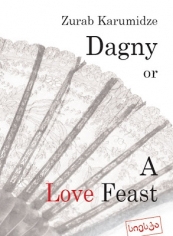DAGNY OR A LOVE FEAST
EXTRACT
My English is inadequate to the task – I’m not a native speaker. Besides, I’m not quite sure what makes me write about a mysterious woman coming from Scandinavia to the South Caucasus to be shot dead by one of her admirers in my hometown over a hundred years ago. Moreover – I’m a bad man: I don’t know what love is and, yes, there must be something definitely wrong with my liver, be-cause I drink too much… Actually, maybe I drink because I don’t know, or maybe I don’t know because I drink? Here, here!
St. Paul, the thirteenth of the twelve, who spoke with the tongues of men and angels, knew what love is. A long time ago he wrote to the Corinthians: “…and though I give my body to be burned, but have not love, it profits me nothing.” And more importantly: “… Love suffereth long and is kind … Love doth not rejoice within iniquity, but rejoiceth within the truth.”
Well, what shall I say of this knowledge?! Me personally rejoiceth within al-cohol, which for sure might contain some truth in it, as the Latin saying has it, however mostly it contains some regular stuff distilled from grapes, barley, grain, or berries, or whatever, which bathes and then shrouds my brain and then bur-ies it… And yes, love is also there, but as far as I can savor it within the 40% per volume it amounts to less than one percent, especially if one drinks alone. Thus to highjack that very St. Paul, the way I understand love is almost the same as a sounding brass or a clanging cymbal would understand the sounds they make or, to be more precise, my knowledge of love equals the knowledge of love “experi-enced” by, say, Eric Dolphy’s flute, when the guy played that old jazz classic You Don’t Know What Love Is on the very same flute.
No doubt, the flute as a musical instrument is something extraordinary: it was invented by a theriomorphic creature, a half-goat, half-god, to celebrate the mo-ment when the physical matter went mad, all in one golden afternoon... As some Gaelic bards suggest, the best flute is made of bone taken from the thigh of a heron crazing by the moon. Maybe this is why nearly all flute players are slightly nuts, like the most obvious of them, Jethro Tull’s Ian Anderson. And yet, the maddest of them was a Russian, Vladimir Mayakovski: once, he even ventured to play his spinal column like a flute… Just imagine him standing on one leg, the other one up, and with his eyes wide shut blowing into the vertebrae – flying so high, trying to remember…
May I suggest here a music-orthopedic definition of love? Love is when her/ his breath is filling up your spinal column with sounds… and the gentle wind moving silently, invisibly… Love that never told can be… Here, here!.. (See PDF)
In case of using the information, please, indicate the source.
